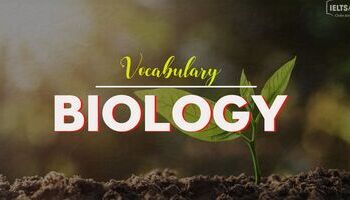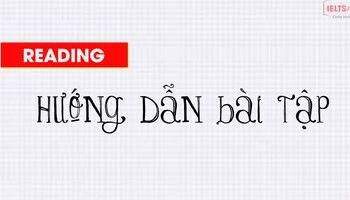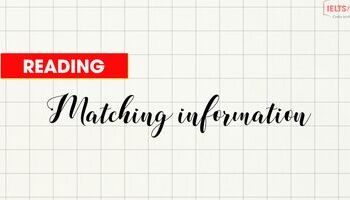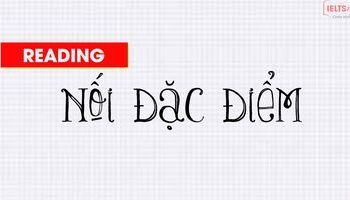Biology /baɪˈɑːlədʒi/ [n]: Sinh học là một chủ đề thường gặp, đặc biệt là các bài đọc. Các bạn cùng theo dõi một số từ vựng dưới đây nhé.
IELTS Vocabulary topic Biology
- Flora /ˈflɔː.rə/ [n]: plants, thực vật
The flora of the Balearic Islands
- Evergreen /ˈev.ə.ɡriːn/ [adj, n]: thực vật/cây thường xanh
An evergreen plant
- Deciduous /dɪˈsɪdʒ.u.əs/ [n]: (nói về thực vật) rụng lá theo mùa
- Ivy [‘aivi] [n]: cây dây leo
Ivy covered the broken walls.
- Moss /mɒs/ [n]: rêu
The rocks near the river were covered with moss.
- Algae /ˈæl.ɡiː/ [n]: tảo, loài thực vật ko có rễ, trôi nổi trên mặt nước hoặc trong nước
- Reed /riːd/[n]: cỏ sậy mọc ven sông, hồ
- Habitat /ˈhæb.ɪ.tæt/ [n]: sinh cảnh
With so many areas of woodland being cut down, a lot of wildlife is losing its natural habitat.
- Ecosystem /ˈiː.kəʊˌsɪs.təm/ [n]: hệ sinh thái
Pollution can have disastrous effects on the delicately balanced ecosystem.
- Foliage /ˈfəʊ.li.ɪdʒ/ [n]: lá cây nói chung
The dense foliage overhead almost blocked out the sun.
- Bough /baʊ/ [n]: cành cây lớn
- Canope /ˈkæn.ə.pi/ [n]: các cành và lá trên ngọn cây tạo thành tán lá
- Bark /bɑːk/[n]: vỏ cây
- Root /ruːt/ [n]: rễ cây
We moored the boat to a large tree root.
- Trunk /trʌŋk/ [n]: gốc cây
- Stem /stem/ [n]: thân cây
- Bud /bʌd [v]: nảy mầm, [n]: mầm, chồi
- Flower /flaʊər/: [v] ra hoa, [n] hoa
Wild flowers
- Genome /ˈdʒiː.nəʊm/ [n]: toàn bộ cấu trúc di truyền của một cá thể, bao gồm rất nhiều genes khác nhau
- Genetic /dʒəˈnet.ɪk/ [adj]: thuộc về di truyền
- Genetics /dʒəˈnet.ɪks/ [n]: di truyền học
A genetic defect/disease
- Cell /sel/ [n]: tế bào
The doctors discovered cancerous cells.
- Tissue /ˈtɪʃuː/ [n]: mô
His face is covered with scar tissue where he was badly burned.
- Evolve /ɪˈvɒlv/ [v]: tiến hóa
Did humans evolve from apes?
- Evolution /ˌiː.vəˈluː.ʃən/ [n]: sự tiến hóa
Darwin's theory of evolution
- Mutate /mjuːˈteɪt/ [v] / Mutation /mjuːˈteɪ.ʃən/ [n]: đột biến
These bacteria have mutated into forms that are resistant to certain drugs.
- Endangered /ɪnˈdeɪn.dʒəd/ [adj]: có nguy cơ tuyệt chủng
Social workers who look after abused or endangered children often have stressful days at work.
- Extinct /ɪkˈstɪŋkt/ [adj]: tuyệt chủng
There is concern that the giant panda will soon become extinct.
- Extinction /ɪkˈstɪŋk.ʃən/ [n]: sự tuyệt chủng
The extinction of the dinosaurs occurred millions of years ago.
- Reproduce /ˌriː.prəˈdʒuːs/ [v]: sinh sản
These plants can reproduce sexually and asexually.
- Reproduction /ˌriː.prəˈdʌk.ʃən/ [n]: sự sinh sản
Sexual reproduction serves to create genetic variety.
- Breed /briːd/ [v]: sinh sản, gây giống, [n]: 1 giống vật nuôi
The blackbird, like most birds, breeds in the spring.
- Fertile /ˈfɜː.taɪl/ [adj]: có khả năng sinh sản
People get less fertile as they get older.
- Fertilize /ˈfɜː.tɪ.laɪz/ [v]: thụ tinh
Bees fertilize the flowers by bringing pollen.
- Fertility /fəˈtɪl.ə.ti/ [n]: sự có khả năng sinh sản
a fertility symbol
- Fauna /ˈfɔː.nə/ [n]: animals, động vật
While she was in Hawaii, she studied the local flora and fauna.
- Human /ˈhjuː.mən [adj]: thuộc về loài người, [n]: con người
The human body is composed of about 60 percent water.
- Species /ˈspiː.ʃiːz/ [n]: 1 loài động vật
Mountain gorillas are an endangered species.
- Wildlife /ˈwaɪld.laɪf/ [n]: động vật hoang dã
A documentary on Peruvian wildlife
- Amphibian /æmˈfɪb.i.ən/ [adj, n]: động vật lưỡng cư
Salamanders, frogs, and other amphibian life are particularly sensitive to extreme pH levels.
- Mammal /ˈmæm.əl/ [n]: động vật có vú
Humans, dogs, elephants, and dolphins are all mammals, but birds, fish, and crocodiles are not.
- Rodent /ˈrəʊ.dənt/ [n]: động vật gặm nhấm
They expect to catch rodents, mostly mice.
- Feline /ˈfiː.laɪn/ [adj, n]: động vật họ Mèo
She had pretty, almost feline features.
- Canine /ˈkeɪ.naɪn/ [adj, n]: động vật họ Chó
The city's canine population (= the number of dogs in the city) has grown dramatically over recent years.
- Ungulate /ˈʌŋɡjuleɪts/ [n]: động vật móng guốc
- Vertebrate /ˈvɜː.tɪ.brət/ [n]: động vật có xương sống
Birds, fish, and reptiles are all vertebrates.
- Invertebrate /ɪnˈvɜː.tɪ.brət/ [n]: động vật không xương sống
- Crustacean /krʌsˈteɪ.ʃən/ [n]: động vật giáp xác
Invertebrates, such as worms, are the main diet of these water birds.
- Primate /ˈpraɪ.meɪt/ [n]: động vật linh trưởng
- Reptile /ˈrep.taɪl/ [n]: bò sát
Humans, insects, reptiles, birds and mammals are all animals.
- Carnivore /ˈkɑːnɪvɔːr/ [n]: động vật ăn thịt
Lions and tigers are carnivores.
- Carnivorous /kɑːˈnɪvərəs/ [adj]: ăn thịt
Lions and tigers are carnivores.
- Herbivore /ˈhɜː.bɪ.vɔːr/[n]: động vật ăn cỏ
Cows and sheep are herbivores.
- Herbivorous /hɜːˈbɪv.ər.əs/ [adj]: ăn cỏ
The iguanadon was a herbivorous dinosaur.
- Omnivore /ˈɒm.nɪ.vɔːr/[n]: động vật ăn tạp
- Omnivorous /ɒmˈnɪv.ər.əs/ [adj]: ăn tạp
Pigs are omnivorous animals.
- Food chain /ˈfuːd ˌtʃeɪn/[n]: chuỗi thức ăn
Corn has many uses throughout the food chain as feed for animals and as an ingredient on its own.
- Predator /ˈpredətər/[n]: động vật săn mồi
Lions, wolves, and other predators
- Scavenger /ˈskæv.ɪn.dʒər/ [n]: động văn ăn xác thối
Most dead birds are picked up by crows or other scavengers.
- Prey /preɪ/ [n]: con mồi
A hawk hovered in the air before swooping on its prey.
- Predate /prɪˈdeɪt/ [v]: săn và ăn thịt con vật khác = Prey on sth
These cave paintings predate any others which are known.
- Tame /teɪm/ [v, adj]: thuần hóa
After a few months' contact the monkeys become very tame.
- Domesticate /dəˈmes.tɪ.keɪt/[v]: thuần hóa
Dogs were probably the first animals to be domesticated.
- Domesticated [adj] : bị thuần hóa
Domesticated animals
- Domestication [n]: Sự thuần hóa
The New York City Department of Health banned the domestication of wild animals such as iguanas.
- Livestock /ˈlaɪv.stɒk/ [n]: vật nuôi nông nghiệp
- Cattle /ˈkæt.əl/ [n]: gia súc
Beef/dairy cattle
- Poultry /ˈpəʊl.tri/ [n]: gia cầm
Some poultry farmers keep turkeys and ducks as well as chickens.
- Feral /ˈferəl/ Ferine /ˈferin/ [adj]: (1 con vật) đã bỏ đi hoang dù trước đó đã được nuôi bởi con người
Feral dogs/cats
- Pest /pest/ [n]: động vật gây hại cây trồng, (bao gồm cả côn trùng, sâu, và các loại động vật nhỏ khác như chim chuột v.v
Common pests such as rats, mice, or cockroaches
- Pesticide /ˈpes.tɪ.saɪd/ [n]: thuốc diệt các loài sâu và động vật gây hại
The pesticides that farmers spray on their crops kill pests, but they can also damage people's health.
Trên đây là những từ vựng chủ đề Biology, các bạn tham khảo để nâng cao vốn từ nhé.





